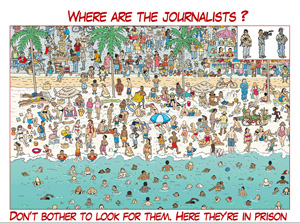Disappointing (if somewhat predicted) news from Doha’s Centre for Media Freedom: founder of Reporters Without Borders (RSF) and director-general of the centre, Robert Menard, has left with his team (heads of the assistance, research and communications departments), according to a release from the organisation.
“For several months we have made an independent voice heard, one that has exposed violence with concern for nothing but the truth. We have helped more than 250 endangered journalists and media all over the world, and I think we can be proud of that,” said Menard in the statement.
“But some Qatari officials never wanted an independent Centre, free to speak out without concern for politics or diplomacy, free to criticise even Qatar. How can we have any credibility if we keep quiet about problems in the country that is our host? Now the Centre has been suffocated. We no longer have either the freedom or the resources to do our work. This cannot go on. I was willing to make any necessary compromises as long as the foundations of our work – assistance grants, statements of opinion – were safeguarded. But that is no longer the case.”
The Financial Times reported last month on clashes between Menard and Qatari officials.
In his departing statement, Menard criticised the local authorities for hampering the centre’s efforts. He claimed that staff from the centre were being prevented from leaving the country and that payment of the centre’s budget, scheduled for April 1, had been repeatedly delayed.
“Sheikh Hamad refused to sign administrative documents that would have enabled the Centre to take in journalists under threat in their own countries, as originally planned. His office told us recently that giving shelter to journalists from countries such as Iran might go against Qatar’s diplomatic interests. This confirmed that the Centre’s independence was, in his eyes, a myth,” said Menard.
